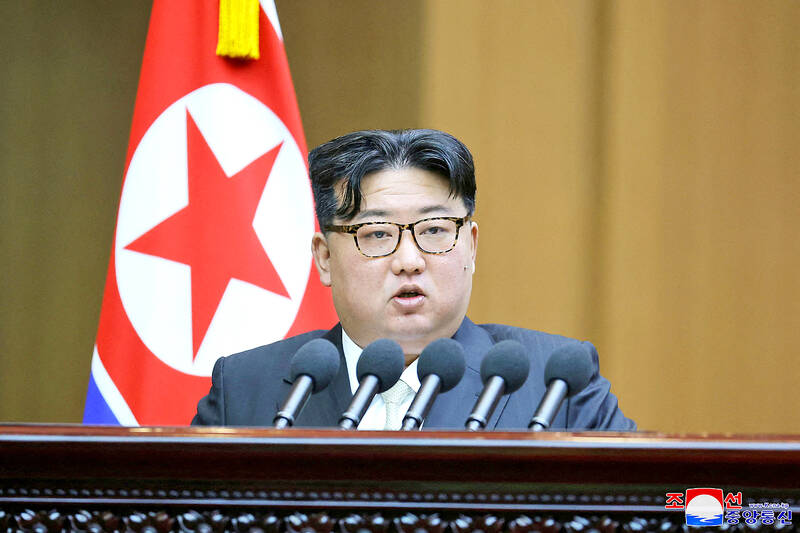North Korean leader Kim Jong-un threatened South Korea with war if “even 0.001mm” of the North’s territory is violated, as Pyongyang abolished agencies that oversaw cooperation and reunification, state media said yesterday.
Kim also said Pyongyang would not recognize the two nations’ de facto maritime border, the Northern Limit Line, and called for constitutional changes allowing North Korea to “occupy” Seoul in war, the Korean Central News Agency (KCNA) said.
In Seoul, South Korean President Yoon Suk-yeol told his Cabinet that should nuclear-armed North Korea carry out a provocation, South Korea would hit back with a response “multiple times stronger,” pointing to his military’s “overwhelming response capabilities.”

Photo: KCNA via Reuters
The hawkish rhetoric on both sides of the border follows a sharp deterioration of inter-Korean ties, with Pyongyang’s spy satellite launch in November last year prompting Seoul to partially suspend a 2018 military agreement aimed at defusing tensions.
Pyongyang’s decision to jettison the agencies charged with overseeing cooperation and reunification with South Korea was announced by North Korea’s rubber-stamp parliament, KCNA said, part of a string of measures that have escalated tensions, including live-fire artillery drills and missile launches.
In a speech delivered at the Supreme People’s Assembly, Kim called for the drawing up of new legal measures to define South Korea as “the most hostile state,” KCNA reported.
“In my opinion, we can specify in our constitution the issue of completely occupying, subjugating and reclaiming the ROK [Republic of Korea] and annex it as a part of the territory of our Republic in case a war breaks out on the Korean Peninsula,” Kim said.
“If the Republic of Korea violates even 0.001mm of our territorial land, air and waters, it will be considered a war provocation,” he said.
The decision comes shortly after Kim labeled South Korea the “principal enemy” and stated that continuing to seek reconciliation was a “mistake.”
In their constitutions, both North and South Korea claim sovereignty over the whole of the Korean Peninsula.
The Democratic People’s Republic of Korea and the Republic of Korea — the North and South’s official names — were founded 75 years ago, but still technically regard each other as illegal entities.
Until now, what passed for diplomatic relations were handled by the South Korean Ministry of Unification and the North Korean Committee for Peaceful Reunification — one of the agencies the Supreme People’s Assembly has now declared abolished.
Cho Han-bum, a researcher at the Seoul-based Korea Institute for National Unification, said that the North Korean system has long been grounded on the idea of reunification, an unachieved wish of the nation’s founding leader and Kim’s grandfather, Kim Il-sung.
“Now he is denying everything that his predecessors have done,” Cho said.
Pyongyang might be engaging in “mirror imaging,” responding to Seoul’s adjustments to the mission of the unification ministry to focus more on human rights issues.
“The Kim (Jong-un] regime is taking disproportionate steps in dismantling its inter-Korean organizations and formalizing a hostile policy line toward the South,” he said.

The CIA has a message for Chinese government officials worried about their place in Chinese President Xi Jinping’s (習近平) government: Come work with us. The agency released two Mandarin-language videos on social media on Thursday inviting disgruntled officials to contact the CIA. The recruitment videos posted on YouTube and X racked up more than 5 million views combined in their first day. The outreach comes as CIA Director John Ratcliffe has vowed to boost the agency’s use of intelligence from human sources and its focus on China, which has recently targeted US officials with its own espionage operations. The videos are “aimed at

STEADFAST FRIEND: The bills encourage increased Taiwan-US engagement and address China’s distortion of UN Resolution 2758 to isolate Taiwan internationally The Presidential Office yesterday thanked the US House of Representatives for unanimously passing two Taiwan-related bills highlighting its solid support for Taiwan’s democracy and global participation, and for deepening bilateral relations. One of the bills, the Taiwan Assurance Implementation Act, requires the US Department of State to periodically review its guidelines for engagement with Taiwan, and report to the US Congress on the guidelines and plans to lift self-imposed limitations on US-Taiwan engagement. The other bill is the Taiwan International Solidarity Act, which clarifies that UN Resolution 2758 does not address the issue of the representation of Taiwan or its people in

US Indo-Pacific Commander Admiral Samuel Paparo on Friday expressed concern over the rate at which China is diversifying its military exercises, the Financial Times (FT) reported on Saturday. “The rates of change on the depth and breadth of their exercises is the one non-linear effect that I’ve seen in the last year that wakes me up at night or keeps me up at night,” Paparo was quoted by FT as saying while attending the annual Sedona Forum at the McCain Institute in Arizona. Paparo also expressed concern over the speed with which China was expanding its military. While the US

SHIFT: Taiwan’s better-than-expected first-quarter GDP and signs of weakness in the US have driven global capital back to emerging markets, the central bank head said The central bank yesterday blamed market speculation for the steep rise in the local currency, and urged exporters and financial institutions to stay calm and stop panic sell-offs to avoid hurting their own profitability. The nation’s top monetary policymaker said that it would step in, if necessary, to maintain order and stability in the foreign exchange market. The remarks came as the NT dollar yesterday closed up NT$0.919 to NT$30.145 against the US dollar in Taipei trading, after rising as high as NT$29.59 in intraday trading. The local currency has surged 5.85 percent against the greenback over the past two sessions, central